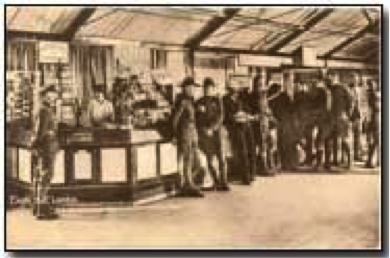Stationery: ON ACTIVE SERVICE YMCA logo on left, inverted triangle on left [as much of his memoir]
London England 4/16/1919
My dearest Olive,
I did not write you yesterday. Wrote one letter to Cecil Bedell. I want to by all means keep in touch with them if I can. You know that I have had one letter from them, but none lately. One of the boys has received word direct from New Jersey since he knew that he was assigned to London Univ, so I suppose I will hear from you within a day or two now.
I drawed my pay the other day and was also reimbursed for my room and soon I will be getting my ration money, which will be over fifty dollars. Think that I will have that within a day or two now. Had I known that things would come my way as soon, I would not have sent for any money. Think that I will not need any of it. You see I am to get 300 a day for my expenses and I do not need all that for board and room. Expenses are not high here, since I stay around the Y so much. You know that the Y is operating two or three big hotels here now, besides a number of very valuable huts. I loaf mostly about Eagle Hut, since it is so convenient for me. King’s College, as you already know, is immediately across the road from the hut. Our hut here is really a hotel because it has all the aspects of one.

I went to the house of Parliament this morning, hoping to gain entrance to the house of commons, where George was to report on the Peace Conference this afternoon. Having received no encouragement., I crossed the street and entered Westminster where I had attended the memorial service for the American soldiers about a week ago. [there are memorial cards apparently from this service in our documents] I meandered about there under the leadership of a “Y” man for about an hour and a half, and saw the remembrances of English History from Edward III to the present time. Saw the Longfellow bust which Irving speaks about in his sketch. You know he says something about the Poets corner in his description of Westminster Abbey. I will go back there again sometime and take a directory book with me and then I can get more out of it. One can easily spend a half day there.
I think that I told you that I had gone to the Ambassador’s office a couple of days to get tickets to parliament to day, but some members of the embassy were going to use them.
Between times I am trying to write a few experiences of my life since I left Camp Sherman to the present time—just for my own enjoyment in later days more that than anything else.
So far I have written about 80 pages long hand on my journey to Bain de Bretagne. Now I must write of my experiences there. It will be interesting for you to read when I return. I enjoy doing it. I have used that diary book you presented me before leaving and know very much what I did those days, and by associating the dates with places I can recall many little thing which we were doing.
I wanted to go to a play this P.M. but the people of England, outwardly are far more religious than we and unfortunately many of the play houses are closed. The Shakespearian dramas begin soon now.
I may take a notion to go to Ireland during last two or three days of vacation and if I do so, I will miss quite a number of things in London. This is certainly an interesting span. Moreso than Paris.
My telling you all this will maybe make you fell homesick for entertainment too. I am only fortunate these few months that is all and I am certainly glad that I got to come. All of the boys are enjoying themselves here.
Ha! I must go and have a venereal inspection to-morrow. Army rules require that every month. that will spoil the most of my morning.
This is enough for this time. Don’t you think? I will be hearing some now how you took my coming to England.
Yours affectionately,
Clyde
[end of document]
Following the U.S. entry into World War One in April 1917 and subsequent shipment of American soldiers to France for active duty, servicemen’s centres were established throughout the world but most notably in Europe. This had been initiated a week earlier with the publication of a General Order (#26-II-1) by U.S. Commander-in-Chief General John Pershing.
Published on 28 August 1917 it affirmed that the Y.M.C.A. would “provide for the amusement and recreation of the troops by means of its usual programme of social, physical, educational and religious services”.
Perhaps the most famous of the servicemen’s centres was the so-called Eagle Hut opened in London on 3 September 1917. Operated by the Y.M.C.A. the centre, staffed by some 800 voluntary personnel, offered overnight accommodation and food for American servicemen passing through London.
The centre additionally helped with arrangements for London sightseeing tours and entertainment. Turnover was heavy: in February 1919 alone 134,566 meals were served. The Eagle Hut remained open beyond the armistice, finally closing its doors on 25 August 1919.
Many other such centres were operated worldwide, each funded through a combination of public government and private subscriptions.
